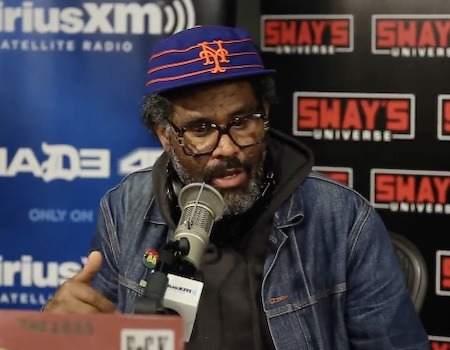If you know the name Sacha Jenkins you already know why he was important to hip-hop — and if you don’t then I’m about to tell you. Before he achieved success in his own right as an author, a documentarian, a producer and a musician (the brother wore a lot of hats) I first heard his name thanks to Ego Trip magazine. He and Haji Akhigbade started a newsletter called Hip-Hop Beatdown in 1992 at the same time I was doing an online magazine called HardC.O.R.E., and both would evolve into something bigger than their origins. Sacha recruited Elliott Wilson and Chairman Mao for his next step into the world of print media, and when I would go to a (good) bookstore and look for rap magazines, Ego Trip was on the shelf next to Rap Pages and The Source.
What Ego Trip had that their peers didn’t was a combination of both reverence AND irreverence for hip-hop. They celebrated the success of the people doing the hip-hop elements but weren’t afraid to piss those same people off if they “made the list” a la Chris Jericho. What list? Ego Trip’s Book of Rap Lists. Published after the print magazine itself had folded, the book was both a love letter AND a middle finger to the culture. On one page you’d find “13 Rappers Recognized for Their DJ Skills.” On another page you’d find “8 Songs With Notoriously Unintelligible Lyrics.” It was as comprehensive as it was fun to read. It paid homage to rap pioneers while also taking playful jabs at embarrassing moments such as “Butter Albums (with) Butt Covers” — then flipping the script to “Butter Covers, Butt Albums” before coming full circle with literal ass cheeks for “Butter Butt Covers.” Irreverent, yes, but done with nothing but love for ya like the late Dwight Myers.
If you think being co-founder of a seminal rap magazine and co-author of one of hip-hop’s most beloved books was the end of Sacha’s story, you’re absolutely wrong. This was only the beginning. He was a writer for The Boondocks when it aired on [adult swim]. He wrote for Vibe and was the creative director of Mass Appeal magazine. He co-authored Eminem’s autobiography “The Way I Am.” He produced a documentary about 50 Cent called “The Origin of Me.” He was part of a rock group called The White Mandingos. Sacha was a relentlessly creative dude and seemed to have no shortage of ways to put out a message, and the message was consistently “I love hip-hop” — even if at times he wanted to deflate a few egos who were tripping too hard. You might know him best though for either Ego Trip’s The White Rapper Show on VH1 or his acclaimed four part documentary about Wu-Tang Clan called Of Mics and Men.
To say I respected Sacha Jenkins’ work is an understatement. The Book of Rap Lists is sitting in my lap right now as I write this. When I learned of his passing today I pulled it off the shelf and started reading it again, and it’s just as dope now as when it was first printed in 1999. It’s funny, it’s thorough, it’s informative, and like everything Sacha Jenkins did it was passionate. In his conversation with Sway Calloway on Shade 45 he made an important point I’d like to convey to you after his passing. Hip-Hop isn’t just the graffiti you see on the wall, the songs you listen to, the amazing turntable tricks, the beatboxing or the b-boy maneuvers. It’s the environment and culture that gave birth to those things. You can’t separate one from the other.
The members of the Wu-Tang Clan came from broken homes with broken dreams and not everything they did to overcome it was admirable (or even legal) but Jenkins didn’t tell their story with a perspective of disdain or a lens of judgment. He grew up where they grew up. He and Nas went to the same school together. If the only part of rap you see is flashy clothes and fat bankrolls then you really don’t know shit. The arts didn’t spring full born into the world like Athena from the head of Zeus. Context is everything and Sacha Jenkins strove to remind us that rap is more than just music and hip-hop is more than just culture. If you want to pay respect to the late great Mr. Jenkins remember to see the forest and the trees and never forget that hip-hop tells a story with or without dope lyrics. RIP.

